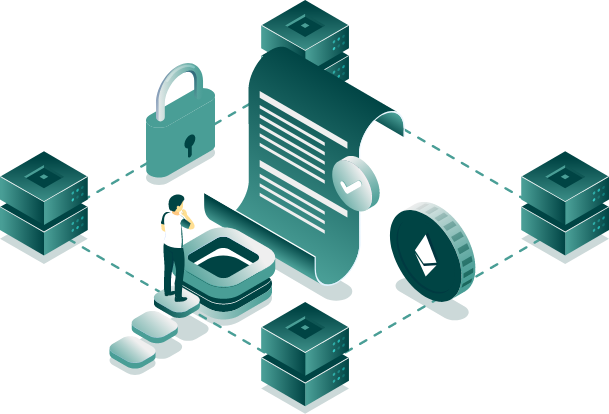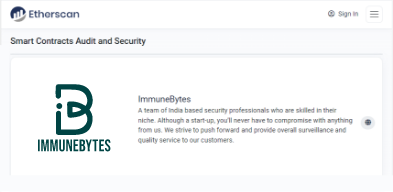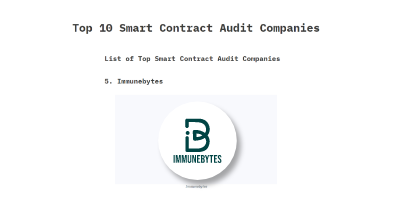Some of the A-League Clients We Audited
We have audited some of the prominent projects in the web3 space. Our team of skilled and ingenious smart contract auditors ensures that all these projects are free from vulnerabilities of all severity levels.
DeFi's leading capital market for crypto-native & real world credit.
View ReportYour Gateway to Real World Assets.
View ReportUnlocking Human Potential with Digital Universal Basic Income.
View ReportUnlock liquidity and amplify rewards.
View ReportConnecting fans with biggest brands through digital collectibles.
View ReportA gamified metaverse which provides interactive experiences.
View ReportWhich Type of Project Do You Want to Secure?
We provide smart contract auditing services for a wide range of blockchain projects.
Our smart contract auditors can audit all types of blockchain projects irrespective of their complexities, especially those that involve financial transactions, sensitive data, or complex logic.
Here are the blockchain project categories for which we provide smart contract auditing services:

Crypto Tokens
Token Contract Security: Our auditors review the token contract code for vulnerabilities and verify access control mechanisms to ensure that only authorized entities can mint, burn, or transfer tokens.
Tokenomics and Economic Model Audit: During an audit, our audit team evaluates the economic model, token supply, distribution mechanisms, incentives, vesting schedules, and distribution to prevent unauthorized access or manipulation.
Token Standards Compliance Audit: Our audits ensure that the token adheres to specific standards such as ERC-20, ERC-721, ER-777, ERC-1155, and others.

Non-Fungible Token
(NFT)
Ownership and Minting: Smart contracts managing the creation, transfer, and trading of non-fungible tokens are susceptible to hacks. We conduct meticulous audits to prevent unauthorized token minting or ownership manipulation.
Compliance with Token Standards: We conduct diligent audits to verify that the NFT contract adheres to the ERC-721 or ERC-1155 standard, depending on the project requirements.
NFT Types: Our Smart contract auditors are competent in carrying out efficient auditing of different types of NFTs, which include Gaming NFTs, Art NFTs, Collectible NFTs, Utility and governance NFTs, Music NFTs, and several others.

Decentralized Finance
(DeFi) Projects
Lending and Borrowing Protocols: We do rigorous auditing of smart contracts involving managing lending and borrowing activities to ensure the security of users' funds remains intact.
Automated Market Makers (AMMs): Vulnerabilities in AMMs used by DeFis for decentralized trading can lead to price manipulation or fund loss. Our extensive audits are designed to uncover such vulnerabilities and prevent malicious exploitation.
Yield Farming and Liquidity Pools: Our smart contract auditors ensure that the smart contracts used for projects involving yield farming and liquidity provision are free from any vulnerability that can jeopardize user assets and rewards.

Decentralized
applications (DApps)
Code Audit: Smart contract audits conducted by our team of expert auditors help identify vulnerabilities and weaknesses in the code and provide actionable recommendations for their mitigation.
Architecture and Design: The audit involves multi-prong checks that cover DApp's architecture and design, data storage, communication protocols, and access control methods.
External Integrations: Our auditors also review integrations with external APIs and assess the security of third-party services used by the DApp to prevent unauthorized access and ensure secure communication.
The Stages of Smart Contract Audit
To streamline the complex process of smart contract auditing, we have defined the following stages all projects must go through.
The output of this process is a comprehensive, effective, actionable, and time-bound analysis report prepared and finalized by our experienced auditors.

1. Preparatory Stage
Get introduced to the project and its goals.
Gather all relevant documentation (lite paper, white paper, code specifications) to understand the smart contract's intended behavior.
Define the scope of the audit, the objectives, and focus areas for the audit process.

2. Automated Evaluation and Unit Testing
Utilize automated tools such as Slither, Echidna, Mythril, SmartCheck, Remix, and Solhint to assess code quality.
Write custom unit test cases to conduct tests in addition to test suites provided by the smart contract developers, if any.
Discover logical bugs using the fuzzing test suite, designed to trigger unexpected or invalid behavior in the system

3. Manual Examination
Scan the code line-by-line to find vulnerabilities and suggest remediation while ensuring it aligns with the business logic outlined in the documentation.
Assess the gas consumption of the contract functions and provide recommendations on optimizing gas usage.
Evaluate the quality of the code and recommend best practices such as code commenting, structure, variable naming, and elimination of duplicated code

4. Preliminary Audit Report
Auditors document their findings and recommendations in a report, which clients review to gain insights into the assessment.
Developers implement necessary changes and fixes in the code based on the audit findings. The refined code is subsequently shared with the auditors for a final review.

5. Final Audit Report
The audit team verifies the accurate implementation of the recommendations made in the preliminary audit report.
The code is again refactored to improve readability and performance, remove code duplication, and ensure that the code's external behavior remains unchanged.
After all fixes have been applied, auditors consolidate the findings and analyses into a final report, which is then submitted to the client for review and reference.

6. Post-Audit Support and Revisions
After receiving the final audit report, developers revise the code to address the identified vulnerabilities and implement the recommended changes made in the final audit report.
The audit team provides further support and clarification during this stage if needed.
Migrate Your Smart Contract From Testnet To Mainnet,
But Without Vulnerabilities.
What is Included in the Audit Report?
We provide a comprehensive smart contract audit analysis report, which provides a detailed and clear overview of the audited smart contract's security, functionality, and overall quality.
It is tailored to the technical team, project stakeholders, and potential investors.
Here are the key elements of a smart contract audit analysis report delivered by us upon completion of the audit.
Project Information: Details about the project, including its purpose, technology stack, and objectives.
Scope of Audit: Clearly defined audit scope, specifying which components were audited and which were not.
Brief Overview: A concise summary of the audit process, highlighting major findings and recommendations.
Testing Logs: Logs from testing tools and environments for reference.
Severity Levels: Categorization of the identified issues in different severity levels (critical, high, medium, low) to provide a quick overview of potential risks.
Vulnerabilities Identified with Technical Details: Detailed enumeration and explanation of security vulnerabilities found during the audit using technical details of vulnerabilities and discovered exploits, with code snippets wherever applicable.
Gas Usage Analysis and Optimization Suggestions: Evaluation of the gas consumption of the smart contract, along with recommendations for optimizing gas usage to reduce transaction costs.
Severity Assessment and Recommendations: Evaluation of the impact and likelihood of each vulnerability and detailed recommendations for fixing each identified vulnerability with code examples if necessary
Prioritized Fixes: A prioritized list of issues that need immediate attention
Code Readability: Assessment of the clarity and readability of the code, including comments and documentation.
Use of Best Coding Practices: Compliance report on the adherence of the code to the industry best practices and coding standards.
Summary of Findings and Overall Assessment: Recap of major findings, emphasizing critical issues and improvements made with an overall assessment of the smart contract's security and functionality.
Crypto Exploiters Stole Away $3.8 Billion in 2022.
Are You Next in the Line?
Common Vulnerabilities Checked During a Smart Contract Audit
Reentrancy Attacks
Reentrancy attacks occur when a contract calls an external contract before it has finished executing its logic. If the external contract calls back into the original contract, it can exploit unguarded state changes.
Integer Overflow/Underflow
Integer overflow and underflow vulnerabilities happen when the result of an arithmetic operation exceeds the maximum or goes below the minimum representable value for the data type.
Unchecked External Calls
If external calls are not properly checked, malicious contracts can be called without verifying the success or failure of the call, leading to unexpected behavior.
Front-Running Attacks
Front-running occurs when an attacker exploits the order of transactions in the mempool to execute trades at the expense of others
Gas Limit Attacks
Attackers can craft transactions that require excessive computational resources, leading to out-of-gas errors and failed transactions.
Access Control Issues:
Incorrectly configured access control can allow unauthorized users to perform sensitive actions.
Timestamp Dependence
Relying on timestamps can be risky because miners can manipulate timestamps to some extent.
Lack of Proper Input Validation:
Failure to validate user inputs can lead to unexpected behavior and vulnerabilities.
Function visibility errors
Functions intended to be private are left susceptible to unauthorized access and manipulation when the default visibility of functions is not changed from 'public' to 'private.'
Other Smart Contract Vulnerabilities Checked During an AuditIn Terms of Crypto Hack Losses, 2021 Was Bad,
2022 Was Worse and 2023? Why Wait for the Worst to Happen?
Blockchain Platforms That We Audit
ImmuneBytes professionals are well-versed in various blockchain platforms and frameworks like Ethereum, Solana, Binance Smart Chain, Algorand, Avalanche, and more!
Languages That We Support
We have a professional team of auditors who are well-versed in different programming languages used to write smart contracts. Among all the other languages, these are the most popular and widely used programming languages we support.
Why is Smart Contract Auditing Indispensable for Blockchain Projects?
Smart contract security audits are critically important for several reasons:
Protection Against Vulnerabilities
Smart contracts are immutable once deployed. Audits help identify vulnerabilities and weaknesses in the code before deployment, preventing exploits and hacks that could lead to financial loss.
Preventing Financial Loss and Fraud
Many smart contracts handle financial transactions. Audits ensure these transactions are secure, preventing unauthorized access and manipulation that could lead to theft or fraud.
Building User Trust
Audited smart contracts assure users and investors about the project's credibility. Knowing that a contract has been professionally reviewed builds trust, encouraging users to interact with the contract and invest in the project.
Avoiding Legal and Regulatory Issues
Audits help ensure the smart contract complies with legal and regulatory requirements, preventing potential legal complications that could halt the project's operations or lead to financial penalties.
Preventing Exploits and Attacks
Smart contracts can be vulnerable to various attacks, such as reentrancy attacks and overflow/underflow vulnerabilities. Audits identify and mitigate these vulnerabilities, preventing malicious exploitation.
Securing Sensitive Data
Smart contracts may handle sensitive user data. Audits ensure that data handling processes are secure, protecting user privacy and preventing unauthorized access.
Maintaining Platform Credibility
For decentralized platforms, credibility is crucial. Audited contracts demonstrate a commitment to security, enhancing the platform's credibility and attractiveness to users and investors.
Ensuring Code Quality
Audits assess the quality of the code, ensuring it follows best practices and coding standards. High-quality code is easier to maintain, less prone to bugs, and less susceptible to vulnerabilities.
Preventing Economic Exploits
Smart contracts often involve complex economic models, such as yield farming. Audits ensure the economic incentives are correctly aligned and prevent unintended economic exploits that could destabilize the platform.
Long-Term Sustainability
Audited smart contracts contribute to the long-term sustainability of a project. The project is better positioned for growth and continued success by preventing security breaches and financial losses
In 2022, Ronin Network Lost $625 Million in an Exploit and Still Survived.
Can You Handle Anything Remotely Close to This?
Why Choose Us?
Following are our USPs (unique selling points), which differentiate us in the highly competitive blockchain and smart contract security auditing market.

Team of Highly Skilled Auditors
Our team of auditors comprises professionals with the requisite expertise and experience in auditing projects based on 15 different blockchains.
They have command over blockchain technology, cryptography, and smart contract security, which comes by staying updated with the latest security techniques and blockchain advancements.

Comprehensive Audit Process
Our audit process is rigorous and thorough. We have made its effectiveness more potent by combining the depth, context, and customized approach of manual review with the speed and consistency of automated tools.
This combination produces a comprehensive evaluation that is low on false positives and extremely high on accuracy.

Tailored Approach
We offer customized audit solutions based on clients' specific needs and the intricacies of their projects.
Our flexible pricing structures and engagement models are designed to accommodate varying project sizes and budgets.

Proven Track Record
We have successfully audited more than 200 blockchain projects and served over 175 clients who have given us rave reviews for our audit quality, project handling, and client servicing.
See our client portfolio and our testimonials to verify our claims.

Client-Centric Approach
Our communication throughout the audit process is transparent and clear. We keep our clients informed about progress, findings, and recommendations.
We ensure personalized attention to our clients to address their concerns and provide a seamless experience.

Post-Audit Support
We provide robust post-audit support and patiently assist clients with issue resolution, deployment, and ongoing security monitoring to ensure a secure system even after the audit is complete

Focus on Innovation
We are constantly working to introduce cutting-edge solutions to increase our ability to identify and mitigate emerging threats and efficiency in the auditing process.
You can also see a list of innovative blockchain security tools we are developing.

ImmuneBytes Seal of Trust
Get an online verifiable link for your audited project with its audited report, which can be set private or public, based on your preferences.
You can use this online verifiable link in your whitepaper, lite paper, website, and social media platforms to instill confidence and trust in the minds of your users and investors.
DeFi Market Revenue Is Projected to Reach $34.7BN by 2027.
The Growth Is Phenomenal, and So Is the Susceptibility to Hacks
As Featured In
Don’t believe us? You can take a look at our appearances in top-tier outlets, news publications, blogs, and security magazines here:
FAQs
Blockchain is constantly evolving as a technology, and the process of smart contract auditing is also changing along with it.Here, we have listed the questions commonly asked about smart contract auditing as a service
Reach out to us if you have any other queries.
Smart contract auditing is the process that involves (manual and automated) analysis of the smart contract's code and functionality to identify potential vulnerabilities, security risks, and flaws in the business logic.
Smart contract auditing is conducted to ensure that the smart contract behaves as intended and is not prone to attacks, exploits, or unintended behaviors that could result in financial losses or other negative consequences.
To make our audits foolproof, along with careful line-by-line manual auditing of the code, we also use various automated tools that ensure that the code is free from the slightest of vulnerabilities, which a malicious hacker could exploit.
We utilize the following tools for automated auditing:
- Static analysis tools such as Slither and Mythril to scan the codebase to identify potential vulnerabilities and security issues.
- Dynamic analysis tools like Manticore for dynamic analysis where a smart contract is executed in a controlled environment while exploring different execution paths to find vulnerabilities.
- Fuzz testing tools like Echidna is used to generate random inputs to the smart contract in order to identify unexpected behaviors and vulnerabilities.
For an effective and foolproof audit, we conduct smart contract auditing by combining the advantages of manual analysis and automated tools while nullifying their respective limitations.
To have more insights about these advantages and limitations, visit Difference Between Manual and Automatic Auditing .
The time taken to finish smart contract auditing of a particular project varies from project to project, based on several factors.
These factors include but not limited to:
- Contract’s complexity
- Codebase size
- Iterations for testing and review
- Audit scope
- Mutual understanding and coordination between the audit and development team
It can take anywhere from a few days to a few weeks. The deadline for finishing the audit is mutually agreed upon during the project’s initial discussion, and at ImmuneBytes, we always live up to our commitments without compromising on quality
The cost of a smart contract audit is not fixed and differs from project to project. Usually, it is calculated after taking the following factors into consideration:
- Complexity of the contract
- Size of the codebase
- Code testing and reviewing iterations
- Scope of the audit
- No of iterations
- Urgency in launching the project
Fill out this form with some essential information, and we will get back to you with an initial quote, which can be modified based on our detailed discussion about the above-stated factors.
Keeping client data safe during a smart contract audit is our utmost priority, and we take it with utmost seriousness.
To maintain confidentiality, privacy, and trust, we have several checks and audit mechanisms that undergo periodic review to achieve absolute compliance.
To assure our clients about the integrity and confidentiality of the data shared for the purpose of audit, we are also open to signing a Non-Disclosure Agreement (NDA) with our clients.
We sincerely value the trust and confidence that our clients put in us, and we leave no stone unturned to ensure that they experience zero inconvenience during their journey from onboarding to the implementation of recommendations marked in the final audit report.
We are readily available to address our clients' questions or concerns about the audit findings and recommendations
When needed, our auditors can also collaborate with the development team to fix the vulnerabilities and issues identified during the audit and prioritize critical issues that could lead to security breaches.
If deemed necessary, we can conduct a re-audit after the reported issues have been resolved to confirm that the vulnerabilities have been properly patched.
Our clients can also seek ongoing support to address any security-related questions or concerns they might have, even after the deployment of the smart contract.
We also do check-in meetings with our clients to address any new requirements or concerns that might have cropped up post-completion of the audit.
You can visit our client portfolio page to explore our ever-increasing list of clients who availed our audit services and were extremely satisfied with the service they received from us.
Some valued clients took their precious time out of their busy schedules and shared their experiences working with us. You can see what they shared on our testimonials page.
Please note that due to a confidentiality clause in our agreement with some clients, we cannot showcase them in our list of esteemed clients.
Following is a detailed list of the information needed to initiate a smart contract audit:
Smart Contract Code
Full source code of the smart contract(s) to be audited, along with a list of all external dependencies and libraries used in the project.
Documentation
a) Project Overview: Project’s purpose, goals, and intended functionality.
b) Tokenomics: Description of token structure, including details about token supply, distribution mechanisms, vesting schedules, and utility.
c) Use Cases: Explanation of specific use cases (if any) and smart contract functionalities within the project ecosystem.
Development Environment
a) Development Tools: Knowledge about the tools and development environment used, including the Ethereum client (e.g., Ganache, Geth) and any integrated development environments (IDEs).
b) Testing Framework: Information about the testing framework used for unit testing the smart contract.
External Dependencies
a) External Contracts: The addresses and ABIs (Application Binary Interfaces) of all contracts that the smart contract undergoing audit interacts with.
b) Oracle Integrations: Details about the oracles and their configurations If the contract relies on external data sources or oracles.
Deployment Details
a) Blockchain Network: Blockchain network details where the smart contract is deployed (e.g., Ethereum mainnet, Ropsten testnet).
b) Deployment Address: The address where the contract is deployed for auditing along with addresses for different contract stages (e.g., development, staging, production), If applicable.
Access Control and Permissions
a) Roles and Permissions: Description of the different roles and permissions within the smart contract, including who can execute critical functions and modify the contract state.
b) Admin Controls: Details about administrative controls and people with access to them.Security Requirements
a) Security Specifications: Any specific security requirements or standards that the smart contract must adhere to.
b) Known Vulnerabilities: Disclosure of any known vulnerabilities or issues identified in the contract.
Previous Audit Reports (if applicable)
The previous audit reports and details about the issues identified and resolved.
Contact Information
Contact details for the development team or project stakeholders who can answer questions and provide clarifications during the audit process.
Legal and Compliance Information
a) Legal Documentation: Relevant legal documentation If the project involves legal agreements or contracts related to the smart contract.
b) Regulatory Compliance: Details of any legal or regulatory compliance requirements the smart contract must adhere to.
Our team of capable smart contract auditors is well-versed in auditing smart contracts with upgradability features and ensures that the audit covers potential upgrade risk
In accordance with our mutually agreed terms and conditions, the audit report can be shared publicly or kept confidential.
Here is an example of a confidential report that has been kept private as per the agreed T&C
We have partnered with many prominent and credible blockchain and smart contract development firms that offer professional consultation on smart contract architecture and design.
Their timely advice can save you from potential issues that can creep in due to inefficient design and poor architecture
Recent Blogs
Everything you need to know to get familiar with Web3! News, Blogs, Announcements and more.































